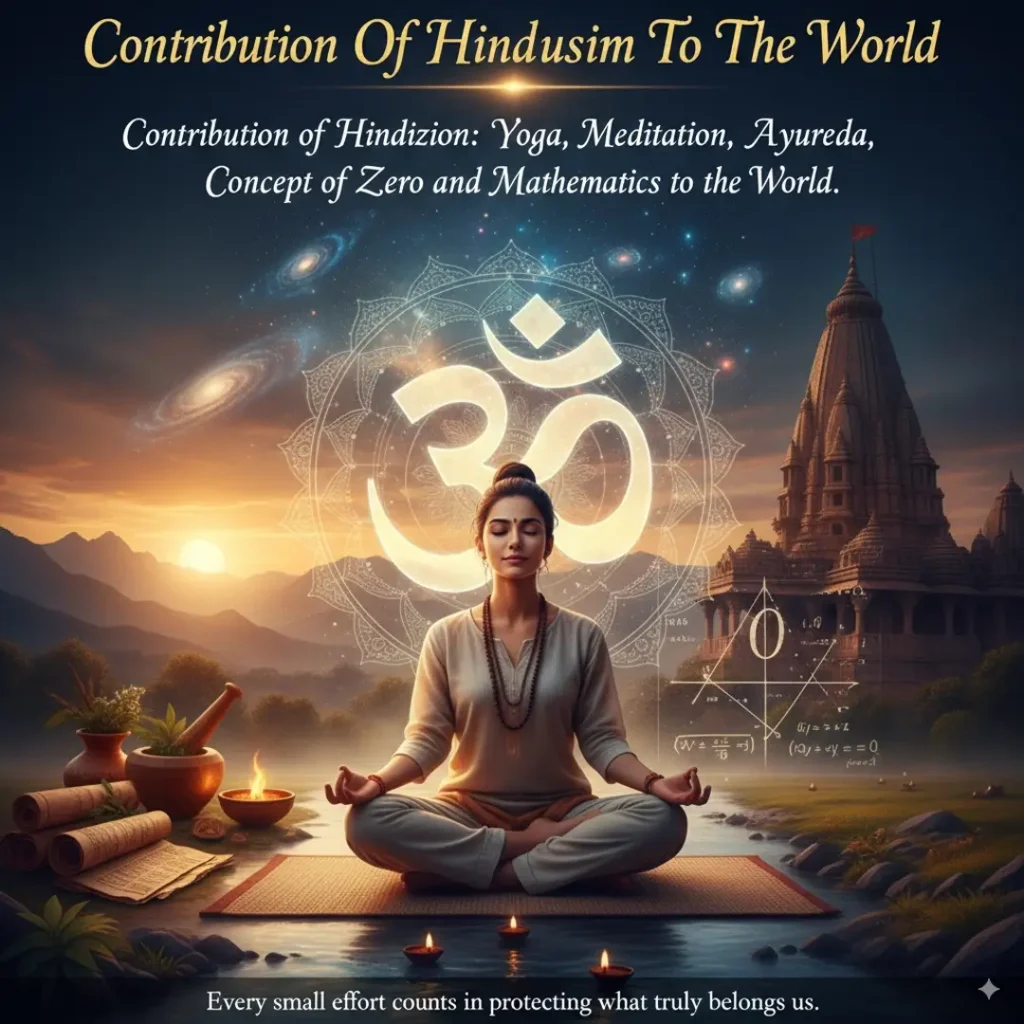Contribution Of Hinduism To The World

Contribution Of Hinduism : Yoga, Meditation, Science, Ayurveda, Concept of Zero and Mathematics to the World.
Hinduism’s rich culture and wisdom have often been overlooked and underestimated. Our traditions and knowledge are at risk as outside influences quietly push to erase them. It’s important for young Hindus today to understand that preserving our heritage is not just about the past. It shapes who we are and how we move forward. By learning, sharing, and living our culture, we keep it alive. This isn’t about fighting others but about protecting our identity and making sure our ancient wisdom continues to inspire future generations. Every small effort counts in protecting what truly belongs to us. (Contribution Of Hinduism)
Contribution Of Hinduism: Aryabhata (476-550 CE):
Concept: Computed pi (TTTT), theorized Earth’s rotation, developed the place-value system.
Founder & Era: Aryabhata, 5th century CE.
Influence Today: The decimal place system and zero are at the root of global mathematics; Aryabhata’s astronomy enabled calendar-making, planetary calculations, and timekeeping worldwide.
Loss of Importance: Aryabhata’s treatises aren’t widely taught in schools, and many key insights were relayed to Europe indirectly via Islamic scholars, sometimes without due credit.
Brahmagupta (598-668 CE)
Concept: Defined zero as a number, negative numbers, algebraic solutions.
Founder & Era: Brahmagupta, 7th century CE.
Influence Today: Modern arithmetic, algebra, and accounting are built on these principles-the earliest rules for solving quadratic equations and working with negative values.
Loss of Importance: The direct study of Brahmagupta’s methods is rare, and his original texts are not prominent outside specialized academia.
Bhaskara II (Bhaskaracharya, 1114-1185 СЕ)
Concept: Infinitesimal calculus, cyclic algorithms (Chakravala), improved trigonometry.
Founder & Era: Bhaskara II, rath century CE.
Influence Today: Elements of calculus, algorithms for equations, and trigonometric identities empowered later European mathematicians and physicists.
Loss of Importance: Kerala School’s advances in calculus predate Newton and Leibniz but remain under-recognized globally; much Indian math history is lost in mainstream teaching.
Charaka (Approx. rst-2nd century CE)
Concept: Foundational texts of Ayurveda-systematic study of physiology, disease, herbal medicine.
Founder & Era: Charaka, early centuries CE.
Influence Today: Ayurveda is a basis for holistic and preventative healthcare, influencing wellness trends worldwide; Charaka’s methods for classification and management of diseases predate modern medical theory.
Loss of Importance: Many original texts are difficult to interpret, and practical Ayurveda is often overshadowed by Western medicine in educational and governmental systems.
Sushruta (Approx. 6th century BCE)
Concept: Detailed surgical procedures (plastic & reconstructive surgery), instruments, procedures for lithiasis and tonsillectomy.
Founder & Era: Sushruta, 6th century BCE.
Influence Today: Plastic surgery techniques and innovations by Sushruta are now fundamental to modern surgery, predating similar Western methods by centuries.
Loss of Importance: European medicine only acknowledged these ancient methods centuries later, often after independent rediscovery; Sushruta’s work hasn’t influenced medical curricula widely in India.
Varahamihira (505-587 CE)
Concept: Accurate astronomical calculations, treatises on meteorology, astrology, and water management.
Founder & Era: Varahamihira, 6th century CE.
Influence Today: Influenced creation of predictive calendars and agriculture-related meteorology.
Loss of Importance: True scale of Varahamihira’s impact on science and engineering is often overlooked in global and Indian education.
Patanjali (Approx. 2nd century BCE)
Concept: Systematic yoga philosophy-eight limbs approach, mental and spiritual development.
Founder & Era: Patanjali, around 2nd century BCE.
Influence Today: Basis of global yoga practices and wellness philosophies.
Loss of Importance: While yoga is globally popular, the philosophical depth and practical applications of Patanjali’s sutras are not widely understood or taught.
Chanakya (Kautilya, 375-283 BCE)
Concept: Statecraft, economics, political strategy (Arthashastra).
Founder & Era: Chanakya, 4th century BCE.
Influence Today: Principles of governance, administration, and economics inform modern policy; his thoughts on diplomacy, espionage, and economic regulation were centuries ahead.
Loss of Importance: Economic and political treatises by Chanakya are not part of mainstream curricula, and much of his pragmatic wisdom is missing in modern discourse.
Baudhayana (8th century BCE)
Concept: Baudhayana’s Sulba Sutras precursor to the Pythagorean theorem, geometry applied to altar construction.
Founder & Era: Baudhayana, 8th century BCE.
Influence Today: Geometry and mathematical logic foundational for architecture and engineering; Pythagorean theorem credited in Greek tradition but discovered earlier in Indian Hindu context.
Loss of Importance: Attribution is often missing, and direct connection to Indian scholars is rarely explained in global math history.
The contribution of Hinduism is not limited to religious faith, but is reflected in every aspect of human life—spirituality, culture, philosophy, yoga, science, and life values. It is important for today’s generation to understand, live, and carry forward this heritage. Our traditions and knowledge are not just relics of the past; they show us the way to live a balanced life in the present and shape the future. Therefore, it is our responsibility to recognize and preserve the Contribution Of Hinduism, so that future generations can also benefit from its invaluable inspiration.
Read This Also
Chanakya mantra (Chant) in English
Durga Saptashati Patha in English
Shri Narayan Kavach in English
Shri Ramcharitmanas in English


 Download the Mahakavya App
Download the Mahakavya App